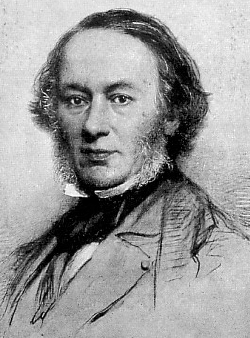Liberty Matters
Cobden and Communication

Reading the exchanges among Stephen Davies, Anthony Howe, Gordon Bannerman, and me over the past weeks, I have been struck at how modern Cobden’s ideas and campaigning strategies appear.
A fine example of this is his connections with the revolutionary campaign to reform the postal system in the 1830s, led by Rowland Hill and supported by reformers such as Henry Cole, Francis Place, and Robert Wallace. Cobden read Hill’s detailed analysis of the deficiencies of the existing postal system and his utilitarian solutions: Post Office Reform: Its Importance and Practicability (1837).[121] He gave evidence to the Parliamentary Select Committee on Postage as a representative of the Manchester Chamber of Commerce. In his evidence he stressed the ineffectiveness of the current system, stating that when he traveled between Manchester and Liverpool he carried pocketfuls of correspondence with him because of the expense and cumbersome nature of the post. He also argued the existing rate of postage was a tax on the poor, effectively excluding them from an essential means of communication and impeding the spread of education. Finally, he emphasized the moral benefits of cheap and simple mass communication. Whilst we should not doubt Cobden’s commitment for post reform on the grounds of moral, intellectual, and commercial improvement, there is no doubt that he also realized the political benefits. In a letter to his ally Charles Pelham Villiers in 1840 he wrote:
We shall radicalise the country in the process of carrying the repeal of the Corn Law, and we are effecting such an organisation by means of the penny-postage (that destined scourge of the aristocracy) that we shall, by and by, be able to carry any measure of a popular nature by a coup de billet.[122]
The Anti-Corn Law League harnessed the power of the new penny post, sending out millions of pamphlets, newspapers, and magazines and even designing their own prepaid stamped envelopes. Cobden estimated that the Corn Laws were repealed two years early because of the introduction of the penny post.
In 1846, after repeal, he wrote to Francis Place:
Bless yourself that you lived in times when reform bills, steamboats, railroads, penny postage, and free trade, to say nothing of ratification of civil and religious liberties, have been possible facts.[123]
There is no doubt that Cobden embraced the revolutionary new technologies of his time, identifying their potential for democratization and mass education. I like to think he would have been equally excited by the opportunities offered by tweets, text messages, and Tumblr blogs.
Endnotes
[121.] Hill, Rowland (1837). Post Office Reform: Its Importance and Practicability. Privately Printed. [https://books.google.co.uk/books?id=PJQIAAAAQAAJ&pg=PP5#v=onepage&q&f=false]
[122.] Cited in Donaldson Jordan, H. (1965). “Richard Cobden and Penny Postage: A Note on the Processes of Reform,” Victorian Studies, 8:4, p. 360.
[123.] Wallas, Graham (1898). Life of Francis Place. London: Longmans, Green & Co., p. 396. [https://archive.org/stream/lifeoffrancispla00walliala/lifeoffrancispla00walliala_djvu.txt]
Copyright and Fair Use Statement
“Liberty Matters” is the copyright of Liberty Fund, Inc. This material is put on line to further the educational goals of Liberty Fund, Inc. These essays and responses may be quoted and otherwise used under “fair use” provisions for educational and academic purposes. To reprint these essays in course booklets requires the prior permission of Liberty Fund, Inc. Please contact oll@libertyfund.org if you have any questions.